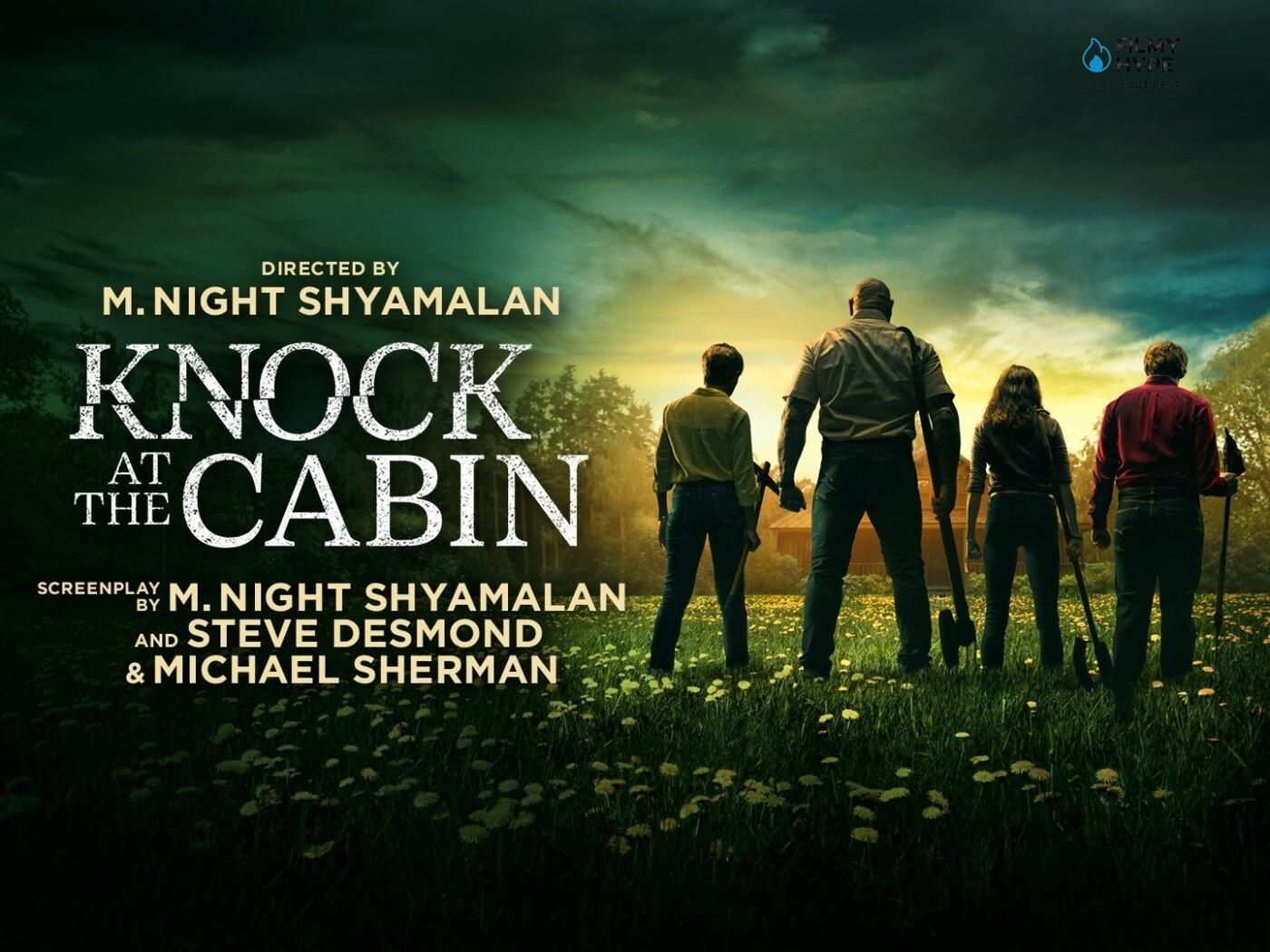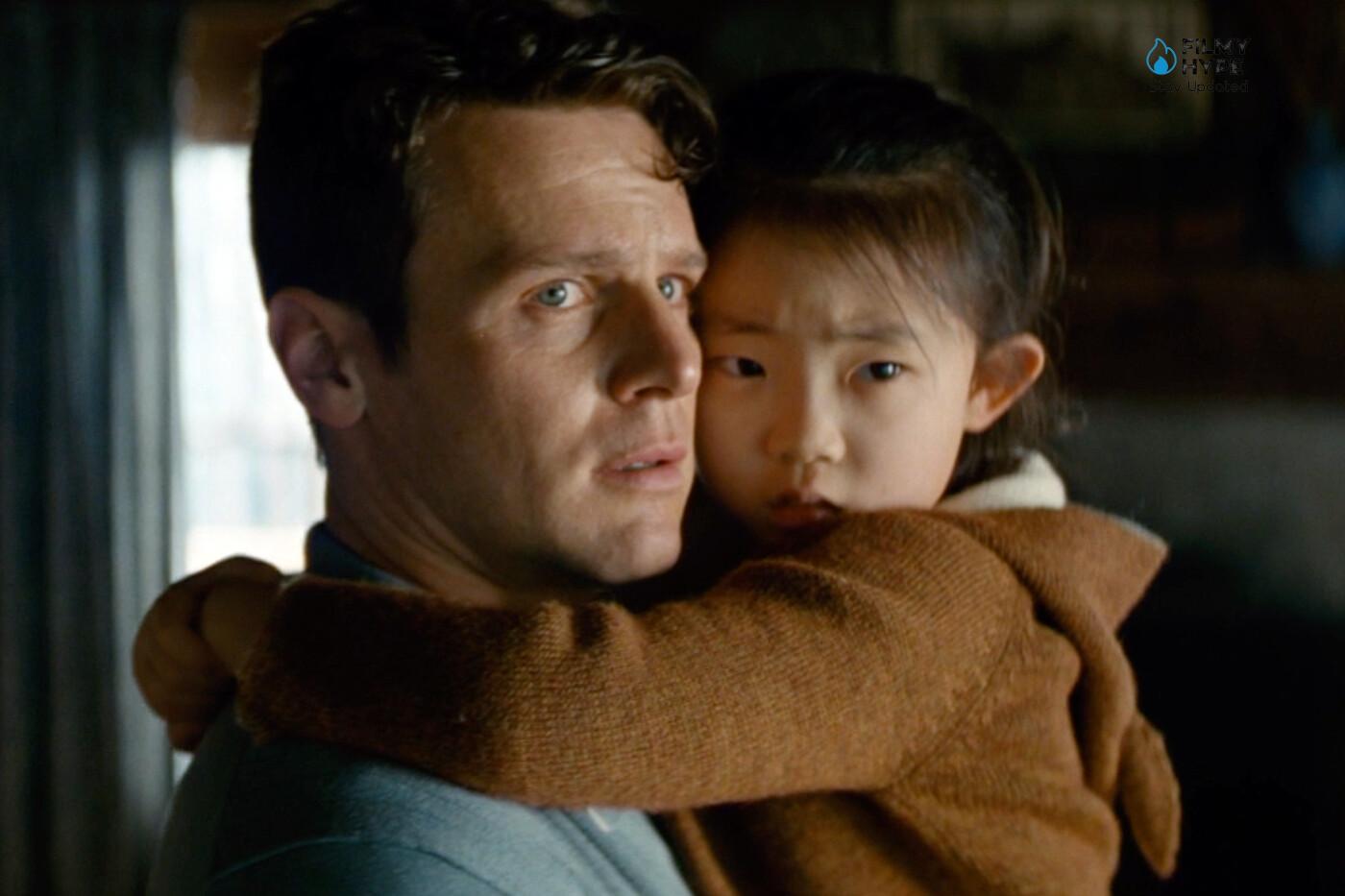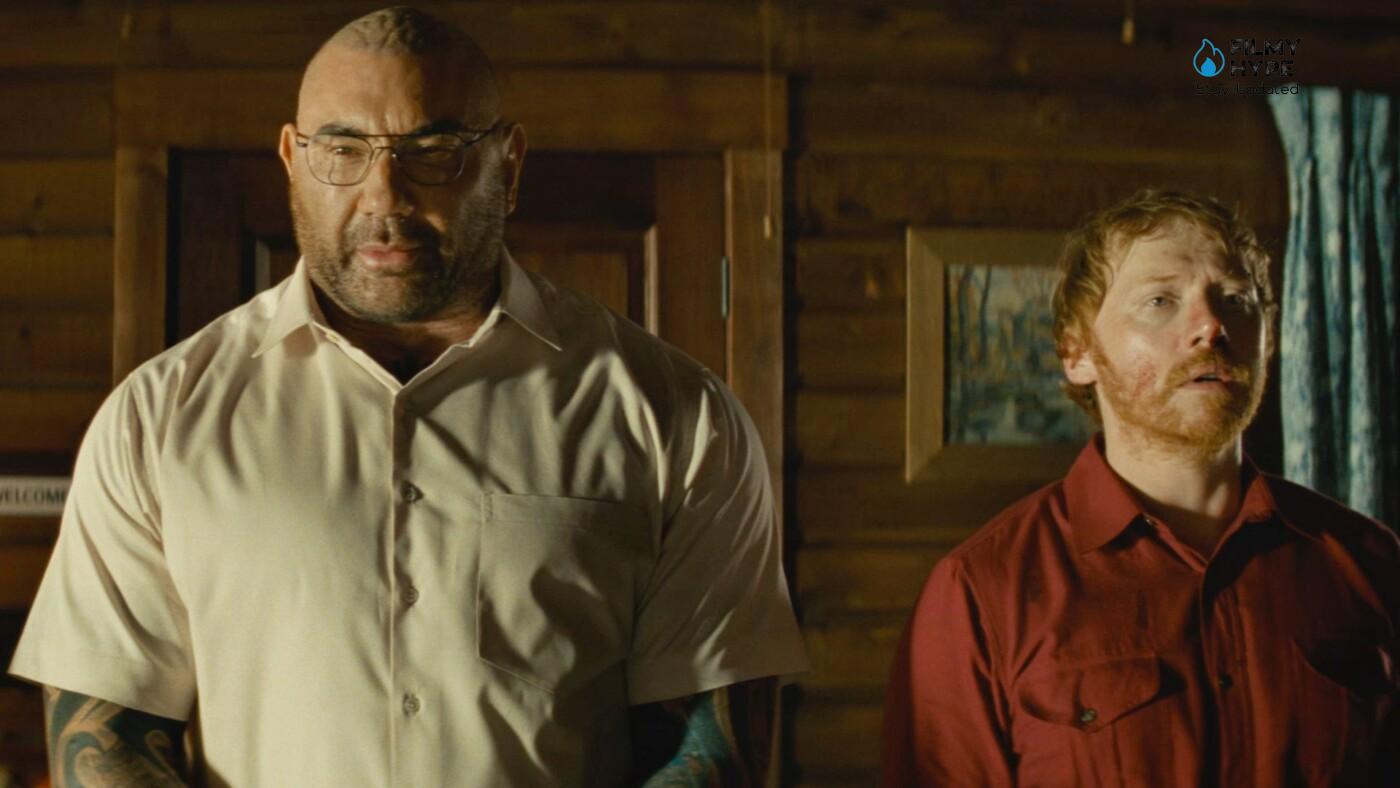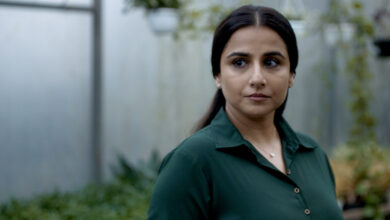Knock at the Cabin Review: Every Choice Hides A Sacrifice | M. Night Shyamalan
M. Night Shyamalan returns to the cinema with Knock at the Cabin, an apocalyptic thriller/horror with moral implications and very human. With Dave Bautista and Jonathan Groff, in theaters from February 2, 2023.
Cast: Dave Bautista, Jonathan Groff, Ben Aldridge, Nikki Amuka-Bird, Kristen Cui, Abby Quinn, Rupert Grint
Director: M. Night Shyamalan
Filmyhype.com Ratings: 4/5 (four stars)
With Knock at the Cabin, Shyamalan, therefore, seems to be returning to a type of story and a setting similar to that used for films such as Signs and The Village. It doesn’t reach those artistic heights, but the result is in any case a particularly lucid film on current society, analyzed in all its fears and its need for sincere human contact. Tense, beautifully interpreted, and stimulating, this new film by the director is, therefore, a fascinating new piece of his artistic career. In response to an epochal event such as the attacks of 11 September 2001, director M. Night Shyamalan made films such as Signs, The Village and Lady in the Water, in which he proposed through allegory a lucid portrait of how the United States United (and the world) were reacting to this tragedy, giving voice to the fears that had arisen and suggesting some possible ways of healing.

About 20 years after those films, Shyamalan returns once again to tell the story of human society, now devastated not only by wars but also by climate change and the Covid-19 pandemic, with the film Knock at the Cabin, which he also wrote and distributed in theaters from February 2 by Universal. It is not an original story proposed by the director, but an adaptation of the 2018 novel House at the End of the World, by Paul G. Tremblay. Still, Shyamalan manages perfectly to make a film about today, about the fear of strangers and the impact that each of us’ choices can have on the rest of the world. Andrew (Jonathan Groff) and Eric (Ben Aldridge), father of little Wen (Kristen Cui), are called to make a choice, to say the least atrocious. When a group of four, including the muscular Leonard (Dave Bautista), enters their house in a far from peaceful way, the three are informed of the arrival of an apocalypse, which can only be stopped with the sacrifice of one of them.
Knock at the Cabin Review: The Story Plot
Wen (Kristen Cui) is a bright little girl but probably doesn’t understand that among the reasons why dad Eric (Jonathan Groff) and dad Andrew (Ben Aldridge) have decided to disconnect from the daily hustle and bustle to go and indulge in a relaxing interlude by renting a chalet in the middle of the woods, far from everything, some are not very pleasant. Andrew and Eric are under siege, homophobic and intolerant, not only in the outside world but also in the family, this is the saddest thing and comes via a couple of flashbacks that M. Night Shyamalan uses to break the tension and make the picture more defined and succulent for the viewer. Indeed, there is a lot of tension.
A Knock at the Cabin begins in earnest when four strangers, jumping out of nowhere, introduce themselves to Wen, Eric and Andrew bringing to their attention an impossible “request”. The first to come forward is Leonard (Dave Bautista), who immediately tries to make Wen like him. He is careful to let her know that he doesn’t want to behave the way she does, but there is no choice. Leonard compensates for his impressive size with a kind and thoughtful manner that makes his aggression more disturbing. M. Night Shyamalan enjoys taking the public’s expectations by surprise. Leonard, Sabrina (Nikki Amuka-Bird), Redmond (Rupert Grint) and Ardiane (Abby Quinn) kidnap the two men and the girl, immobilize them, and are ready to resort to violence in case of escape. But always with education, kindness, and a lot of sincere empathy.
Four good people were brought to the extreme by an extreme situation. The reason for this inner conflict, an unusual mix of delicacy and violence (not just psychological), is a huge stake. The game, because it has all the contours of a game despite the perverse consequences, proposed by the four (pay attention to the number) assailants to Wen, Eric and Andrew, forces them to make an impossible, painful choice that would change them forever. You cannot go back. If, on the other hand, the three refuse, it’s the end of the world, literally. The apocalypse can only be stopped by choosing. A key theme of Knock at the Cabin is choice.

In Shyamalan’s cinema, it is what we don’t see that scares us the most. Knock at the Cabin is no exception, which leads the viewer to be confined to a house in the woods together with the protagonists. The outside world is therefore excluded, showing itself only through the images of the news. Television, therefore, becomes a window to the outside, proposing images that are decidedly not dissimilar from those that pass every day on TV or any other device of this type. It’s a bold choice for a film centered around an imminent apocalypse, yet we soon realize that you don’t have to see much of the ruined world being told to be terrified of it.
A brief description of what is happening is enough to put us on the alert and Shyamalan knows perfectly well that, in a society where the uninterrupted flow of images makes us increasingly insensitive to them, showing as little as possible and therefore leaving the viewer without references is what really can generate fear. We, therefore, remain inside the house, where the fate of the innocent family and all humanity is being decided. Confinement can only recall those three titles mentioned at the beginning, from which the director also seems to be inspired in the use of the allegory at the base of Knock at the Cabin, through which to speak of humanity.
Audiences know what to expect from M. Night Shyamalan because they know his idea of the world and the medium. Genre cinema, from horror (The Sixth Sense) to science fiction (Signs) to period film (The Village) to comics (Unbreakable and beyond) and at the same time the ability to work within the framework of conventions of a certain type of storytelling to offer something more structured and profound. It also applies to Knock at the Cabin. The vision that supports it is the author’s vision, the pleasure of the story and its shocks less so. This is to say that the cinema of M. Night Shyamalan is based on the attempt to maintain a balance between impulses (authorial and otherwise) that arrive from different directions. But the vacation is always, in any case, popular. For the film to work, it doesn’t need so many round tables as it does people in the theater and popcorn.
Knock at the Cabin Review and Analysis
During the film, therefore, simply and directly, Shyamalan confronts us with what we have become and with what we could become if the right choices are not made. The tension is palpable, right from the very first scenes, where Wen’s carefree playing in the woods is interrupted by Leonard’s appearance on stage. Speaking precisely of this last character, it is difficult not to notice how much Dave Bautista reveals himself to be an interpreter capable of balancing opposites, not minimizing his majesty but rather enriching it by endowing his Leonard with kindness for which one is not ready.
Returning to the film, from the arrival of the four strangers there will therefore be a succession of expectations, unsaid and twists that increasingly increase the sense of agitation, always having in mind the basic premise or the choice that the protagonists will have to first or then accomplish. Who knows if similarly, to The Village, this Knock at the Cabin will establish itself as the best film capable of narrating our contemporary, it certainly proves to be a work consistent with the director’s previous production, both aesthetically and thematically, offering a convincing evolution in his search for the essence of today’s society.
Through the allegory proposed in this film, Shyamalan invites us to reflect on the value of the choices we make every day, on the essential importance of faith and love, but also to rethink the role of images and their weight on the conscience of humans. An extremely lucid and important film, therefore, to which some less convincing narrative passages can be forgiven, and above all capable of intelligently keeping one’s breath in suspense and pushing the viewer to active participation (which is not frequent nowadays), from which it is difficult you will leave disappointed. Once again, therefore, Shyamalan confirms himself as a magnificent narrator of his (and our) times.

The apocalypse imagined by M. Night Shyamalan has a human, very human face. The most gratifying aspect of Knock at the Cabin is the direction that harmonizes genre mechanics (shock, violent deaths, suspense) and emotional implications. What is the end of the world made of? First, exteriorities are a minestrone of catastrophic suggestions seasoned with plane crashes, tidal waves, and invisible viruses. Shyamalan plunders the recent (and not only) repertoire of bad memories to offer us the disturbing fresco of an imminent end that had even sent some warning to us, only we were too busy feeding our selfishness to notice it. References to current events should not be overestimated, but rather contextualized: Covid is a cumbersome ghost for the Knock at the Cabin which however is not a film about the pandemic. Better not only. His message is moral and sentimental at the same time and also very universal.
And here we return to the humanized apocalypse and the weight of choice. In the film, everyone is led to measure themselves against the unsettling and irreversible impact of a choice. This applies to the four “attackers”, torn apart by contradictory impulses and instigated by mystical visions that they could ignore. The tension is all about the contrast between the innate sweetness and the imposing physicality of Leonard (Dave Bautista), both a good and violent giant; for the American actor, the film also serves as an attempt to gain credit as something else, more multifaceted and mature than in the past. The burden of choice weighs above all on the two fathers and the little girl. They could ignore the burning world and wander the uninhabited earth, intact. Maybe they will because of the moral crossroads that nails them to their responsibilities, one of the three has to go for the world to be safe, it’s tragic.
Existential precariousness and where to find it. For Eric, Andrew and Wen, being a good father and being a good daughter means understanding that you don’t live alone, and that choice also means measuring the impact of your selfishness on the selfishness of others. You don’t go through life unscathed. Everything hangs in balance, here is the strong link with current events. The family of Knock at the Cabin is the least traditional one can imagine, with two fathers, and an adopted daughter. They must choose whether or not to sacrifice themselves for the sake of a world that has done nothing but hurt them. Which adds further fuel (morale) to the fire.
Knock at the Cabin Review: The Last Words
Fear, choice, family, and sacrifice. M. Night Shyamalan’s cinema in general, the horror/moral/spiritual suggestions of Knock at the Cabin express an attempt to delve into the possibilities of the genre to bring out some illuminating truth about the human condition. Not forgetting the fun. The biblical-apocalyptic imagery is sketched in the essential features without going into too much depth, but perhaps it is inevitable; otherwise, it would have weighed down a film that makes it a point of honor to get to checkers as quickly as possible. Gruesome horror is effective, thriller less so. With the terrifying psychological implications of the invaded house, the claustrophobic work on the spaces, and the tension that derives from it, a Polanski of fear would be needed here, they needed a more aggressive touch, a more casual and creative direction. M. Night Shyamalan’s authorial instinct went a bit in circles.







